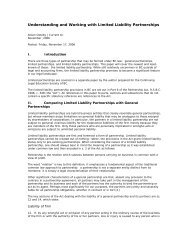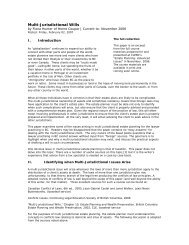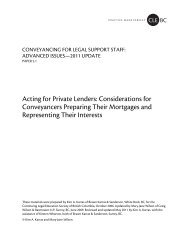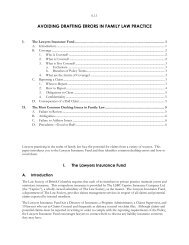Joint Ventures-The Limited Fiduciary Relationship Structure
Joint Ventures-The Limited Fiduciary Relationship Structure
Joint Ventures-The Limited Fiduciary Relationship Structure
Create successful ePaper yourself
Turn your PDF publications into a flip-book with our unique Google optimized e-Paper software.
5.1.8<br />
While the sharing of profits of a business is prima facie evidence that a partnership exists, it is possible<br />
for sharing of “net” profits in a JV as well. However, in a US mining JV, gross revenues (or the JV’s<br />
output/production) are more typically separately allocated to JV participants as are the expenses and<br />
costs. Each JV participant deals separately with the output allocated to it and calculates a separate net<br />
profit or loss. This separate access to production is key in US tax law to ensure non-partnership<br />
treatment of the JV.<br />
9. Limitation of Liability<br />
Partners in a partnership are generally legal agents of the others and all are normally jointly and<br />
severally liable for all the debts of the partnership (although such third party liability does not apply to<br />
limited partnerships which are specifically designed to permit investment without such liability to<br />
passive investors). JV agreements normally provide that JV participants are only liable for their<br />
respective proportions of the JV’s investments and agreed expenses. To the extent there are cost<br />
overruns incurred by the managing or operating participant (usually another participant but possibly a<br />
third party retained to be “operator” or “manager”), that managing party is liable to the other<br />
participants to discharge those overrun obligations. A JV should not normally contract in its own<br />
name because it is not a legal entity which is why the participants appoint either one of the<br />
participants or a third party contractor to act as “operator” or “manager” being the party who assumes<br />
responsibility for all agreements with third parties. Although responsible to third parties, the operator<br />
is usually indemnified by the JV participants for certain types of liabilities and risks. <strong>The</strong> operator is<br />
financially responsible and solely at risk for those agreed activities which, if badly carried out, are its<br />
“fault.”<br />
10. Tax Treatment of Contributions and Distributions<br />
A JV is often established with an intention by the participants that the capital assets contributed for<br />
the JV’s use are not being disposed of by the contributor but rather the participants are allowing such<br />
assets to be used by the JV and they expect to get them back upon wind-up of the JV. Assets<br />
“contributed” to a partnership are considered disposed of for tax purposes and create a taxable event<br />
unless a “rollover” is available. <strong>The</strong> dissolution of a partnership generally results in a final disposition<br />
of its property and distribution of the proceeds whereas the dissolution of a JV may result in a<br />
cessation of use of the contributed property (e.g., termination of a technology license). A partnership<br />
interest is normally regarded as capital property for income tax purposes so that a sale of a partnership<br />
interest usually results in a capital gain or loss. However, a JV interest is not recognized as capital<br />
property and the sale of the interest would be taxed as though the participant’s interest in each of the<br />
specific assets of the JV were sold (to the extent the JV assets are sold to a third party on termination<br />
or otherwise). Where a particular arrangement has been classified as a partnership or JV for income<br />
tax purposes, it should have the same status for GST purposes as well.<br />
D. Civil Law<br />
According to the Guidelines, a JV relationship is not recognized under Quebec civil law in the same<br />
way that it is under common law. Nevertheless, Quebec civil law does not prohibit the formation of a<br />
JV and where a JV has been established under the common law guidelines, it will generally be regarded<br />
as a JV at least for GST purposes. Quebec decisions have held that an arrangement that might satisfy<br />
the common law JV Guidelines will be regarded as a partnership under civil law, where:<br />
(a) the agreement is oral;<br />
(b) the written agreement does not contain a clause which indicates the contractual<br />
relationship is not to be governed by the rules concerning partnerships; and
















